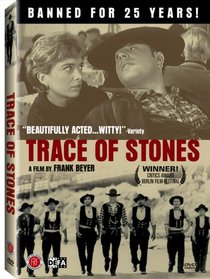| Actors: Manfred Krug, Jutta Hoffmann, Eberhard Esche, Helga Goering, Krystyna Stypulkowska Director: Frank Beyer Genres: Indie & Art House, Drama Sub-Genres: Indie & Art House, Drama Studio: First Run Features Format: DVD - Black and White,Widescreen - Subtitled DVD Release Date: 10/23/2007 Original Release Date: 01/01/1966 Theatrical Release Date: 01/01/1966 Release Year: 2007 Run Time: 2hr 13min Screens: Black and White,Widescreen Number of Discs: 1 SwapaDVD Credits: 1 Total Copies: 0 Members Wishing: 1 MPAA Rating: Unrated Languages: German Subtitles: English |
Search - Trace of Stones on DVD
  | Trace of Stones Actors: Manfred Krug, Jutta Hoffmann, Eberhard Esche, Helga Goering, Krystyna Stypulkowska Director: Frank Beyer Genres: Indie & Art House, Drama UR 2007 2hr 13min {Winner! FIPRESCI Award-- Berlin Int'l Film Festival 1990} — Foreman Balla is the swaggering, self-proclaimed king of a massive construction site, and his co-workers stick close to him like musketeers. But when a new Party ... more » |
Larger Image |
Movie DetailsSimilar Movies
|
Movie ReviewsThe Magnificent Seven Judith Johnson | Albany, NY | 07/05/2008 (4 out of 5 stars) "East German film director Frank Beyer was 34 when he made Traces of Stones in 1966. This film is proof that the New Wave aesthetics of self-conscious rejection of classical cinematic form and youthful iconoclasm infiltrated the Iron Curtain as it were. Traces of Stones gently examines social and political upheavals of the era, and its extended flashback narrative interrupted again and again by present time showcases the director's experiments with editing, visual style, and narrative parts. When the lead construction worker Hannes Balla's team appears for the first time, dressed in cowboy's attire, lined up in battle formation, and beaming with energy and self-confidence, this image is homage to the films The Magnificent Seven and Kuosawa's Seven Samurai. It also gives the film a Jim Jarmusch quality.
The plot involves a young Party secretary, Werner Horrath, who has arrived at a large construction site. From an academic background, he brings with him not only ideology but even more so idealism, and thus also the courage to correct mistakes in the sacrosanct site plan. Both he and Balla fall in love with the young engineer, Kati Klee, the privilaged daughter of a Party boss. At first it is the intellectual and not the carpenter who wins the young woman's heart; however, the Party does not permit the married man to indulge in any unrestricted passions. Horrath's rival Balla is actually the real boss at the site; he argues with the representatives of the political authorities and procures every kind of needed building material in a highly unconventional way. After a long period of arguing over the film, it was shown for the first time in the GDR in the summer of 1966, but was withdrawn from the movie theaters a short time later. This example of the state's power also gives an idea of why the GDR always had so much difficulty with its own development: whatever cannot be tamed is regarded as anarchistic and dangerous - like Beyer's fearless protagonists-Balla and Horrath, or like the film itself. Ironically, in the story no threat to the system and no fundamental doubts about it are expressed. It is, more importantly, a vigorous plea for a more open, more courageous and more human way of dealing with people, and against the less endangered moral cowards and opportunists. " |





